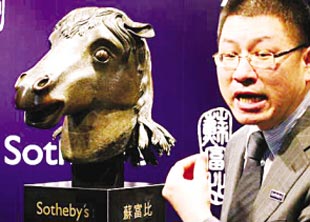This October, Sotheby's Hong Kong Ltd. will auction a bronze horse head that French troops stole from Beijing's Yuanmingyuan Park, also known as the Old Summer Palace, in 1860. China's Special Fund for Rescuing Lost Cultural Relics from Overseas told the media yesterday they firmly rejected the public auction.
A Fund official said it would hurt Chinese people's feeling if the bronze horse head were auctioned as scheduled, eight days before the anniversary of Yuanmingyuan being plundered by the Anglo-French Allied Forces on October 18, 1860.
The official reiterated the cultural sovereignty and protection rights on cultural relics lost overseas, especially those immovable, adding "It's every Chinese's long-cherished wish to return the national treasure to the country and we are capable of purchasing the bronze horse head. However, it would violate the original intention of the auction if anyone intended to raise the price an unreasonable level."
Responding to the rejection, Sotheby's Hong Kong spokesperson said it's honorable to provide a platform for the return of the national treasure by auction. They would try all efforts to legally send the bronze back home, adding: "We are confident that it will be repatriated to China."
However, according to the Fund, if not auctioned, the horse head would still be in China; if sold, it might be possibly sent overseas again and be difficult to recover. As for an expected high price of 60 million Hong Kong dollars (US$7.7 million), Sotheby's said it's for historical, aesthetic, and marketing reasons.
The current owner, an unidentified collector from Taiwan, paid 181,500 British pounds (US$367,000) for the bronze relic in 1989 at a Sotheby's auction in London, according to the Sotheby's spokesperson.
Sotheby's autumn auction preview will be held in Taiwan today, but without the bronze horse head. And in the following Shanghai and Beijing previews, it also won't be exhibited for reasons of "transportation and safety."
Currently four bronzes are displayed at the museum in Beijing: the pig, ox, monkey, and tiger heads. These four bronzes, with other eight still missing, represent the signs of the zodiac in China. They were created in the Qing Dynasty, and originally stood in Yuanmingyuan Park, owned by a Qing loyal family.
The bronzes, showing perfect combination of Western and Chinese arts, hold a very important position in the history of Chinese sculpture.
The Special Fund under the China Social-Cultural Development Foundation was founded in 2002 with the support of over 300 experts and business people. It's an NGO, aimed at rescuing China's lost cultural relics.
It proposed three ways in which the fund can rescue overseas culture relics. The first way is donation; enterprises or individuals buy relics and then donate them to the government via the fund. The second is to buy these cultural relics with money accumulated by the fund. The third is to demand the return of cultural relics stolen during the 19th century invasion of China by Western countries.
In 2003, a priceless bronze pig's head was returned home. Macao entrepreneur Stanley Ho donated 6 million yuan (about US$722, 892) to buy back the sculpture from an American art collector, after which it was donated to the Poly Art Museum in Beijing.
(China.org.cn by Zhou Jing, September 7, 2007)


